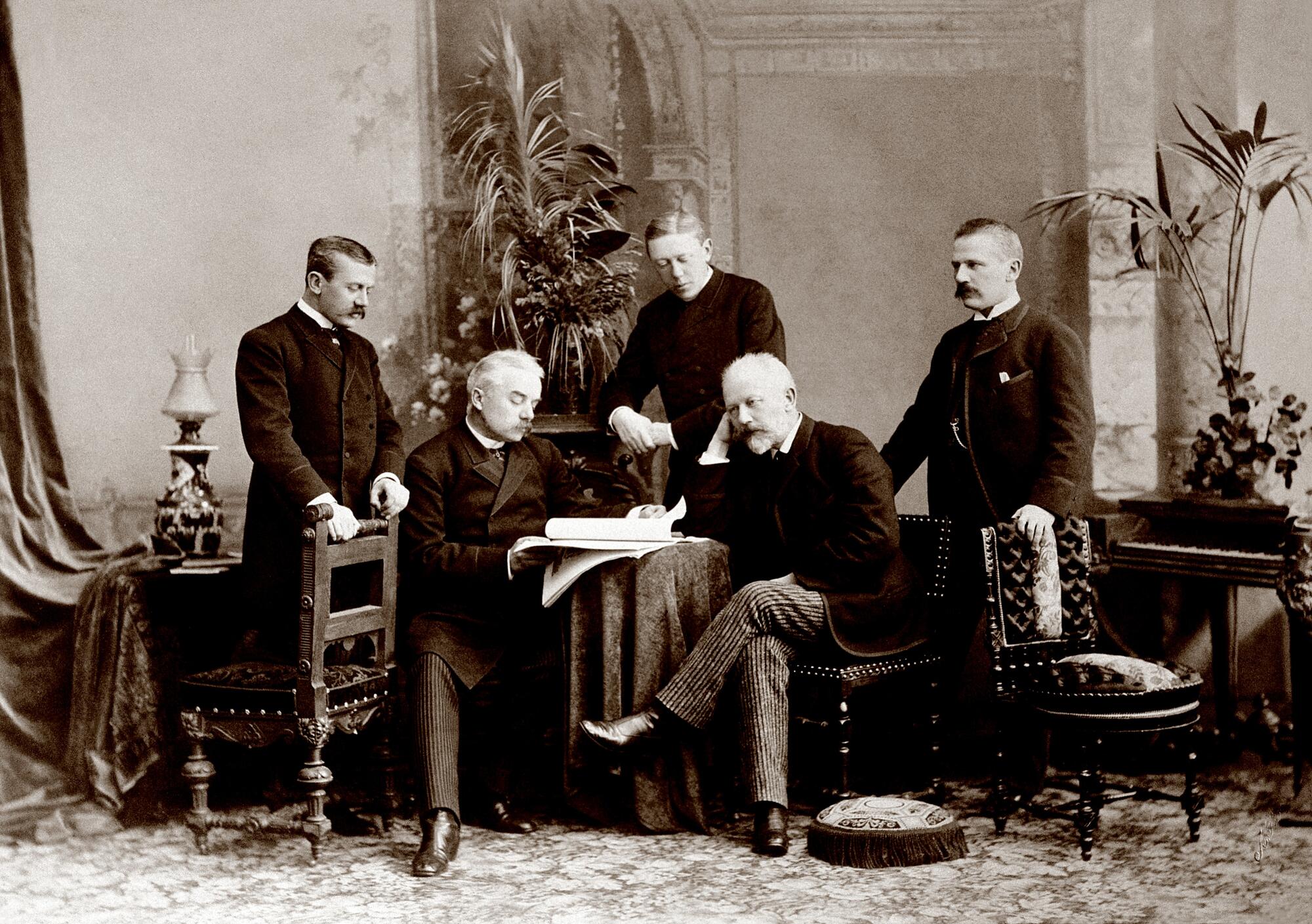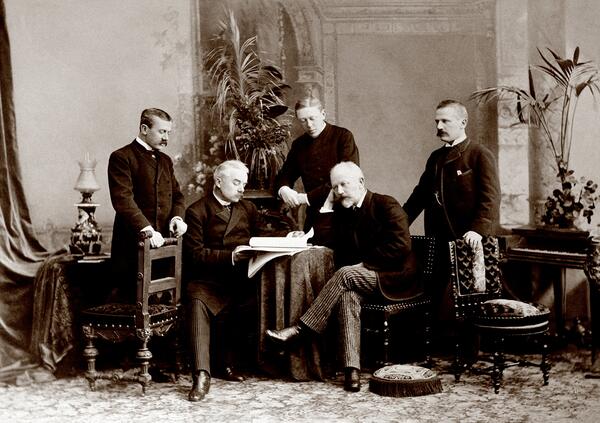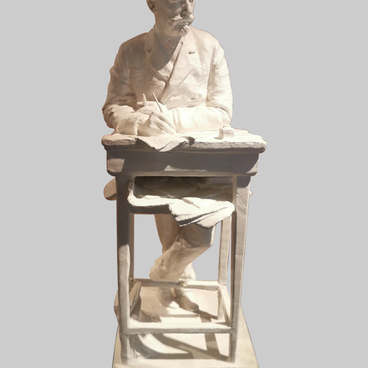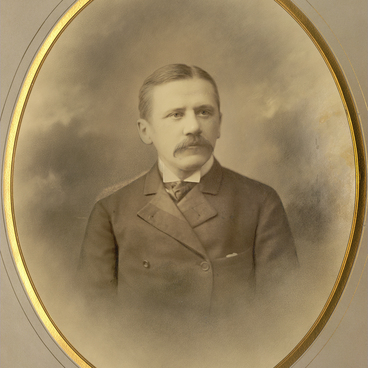The photograph was taken in 1890 at the Alexander Pasetti photo studio; all Tchaikovsky brothers are captured in this shot. Nikolai is on the left (1838–1911), Pyotr is on the right. IppolIt is in the center (1843–1927), the twins Anatoly (1850–1915) and Modest (1850–1916) are on the right and on the left.
The composer’s elder brother, Nikolai, followed in their father’s footsteps and joined the St. Petersburg Mining Cadet Corps. Although he got trained as a mining engineer, he spent most of his life working as a railroad engineer and wrote several scientific and technological papers on the subject of railroads. Pyotr Tchaikovsky visited his estate in Ukolovo, Kursk Governorate, twice: he stayed at his brother’s place in 1891 and 1893, on his way to Tiflis (modern Tbilisi).
As for the middle brother, IppolIt, their father wanted him to join the Mining Corps as well, but it was the boy’s dream to become a sailor. They decided to draw lots. A common tradition at the time was to put pieces of paper behind an icon. IppolIt pulled the piece with the name of the naval college. During his studies, he served as an officer on naval vessels and then switched to the merchant navy. Due to the nature of his service, IppolIt lived in Odessa and Taganrog; he retired as the Admiralty Major-General.
Younger brothers — twins Modest and Anatoly — were especially close to Pyotr Tchaikovsky. The boys were only four years old when their mother died, so the future composer was taking care of them. The twins graduated from the Imperial School of Jurisprudence. Anatoly Tchaikovsky started his career as a lawyer in Kyiv and later worked in many different cities of the Russian Empire. In the late 1880s, he was appointed Vice-Governor of Tiflis, then — Revel (present-day Tallinn) and NIzhny Novgorod. Later in life, he worked for the Ministry of Internal Affairs in St. Petersburg. As for Modest Tchaikovsky, he quit service aged 25 to take up literature. He is known as a librettist, playwright, and translator. Pyotr Tchaikovsky saw his younger brothers more often than his elder ones. He visited Anatoly in Tiflis and Nizhny Novgorod on several occasions and stayed with Modest in St. Petersburg; he also had both of them visit his estate near Klin.
Tchaikovsky brothers were very close and supportive, always exchanged letters, and paid visits to each other. All of them were creative individuals and were fond of arts and science, apart from their main professions. Anatoly Tchaikovsky was good at playing the violin and took part in theater productions. After the composer’s death, Modest Tchaikovsky founded the P. I. Tchaikovsky House-Museum, became its custodian, and wrote the first-ever biography of his brother.
The composer’s elder brother, Nikolai, followed in their father’s footsteps and joined the St. Petersburg Mining Cadet Corps. Although he got trained as a mining engineer, he spent most of his life working as a railroad engineer and wrote several scientific and technological papers on the subject of railroads. Pyotr Tchaikovsky visited his estate in Ukolovo, Kursk Governorate, twice: he stayed at his brother’s place in 1891 and 1893, on his way to Tiflis (modern Tbilisi).
As for the middle brother, IppolIt, their father wanted him to join the Mining Corps as well, but it was the boy’s dream to become a sailor. They decided to draw lots. A common tradition at the time was to put pieces of paper behind an icon. IppolIt pulled the piece with the name of the naval college. During his studies, he served as an officer on naval vessels and then switched to the merchant navy. Due to the nature of his service, IppolIt lived in Odessa and Taganrog; he retired as the Admiralty Major-General.
Younger brothers — twins Modest and Anatoly — were especially close to Pyotr Tchaikovsky. The boys were only four years old when their mother died, so the future composer was taking care of them. The twins graduated from the Imperial School of Jurisprudence. Anatoly Tchaikovsky started his career as a lawyer in Kyiv and later worked in many different cities of the Russian Empire. In the late 1880s, he was appointed Vice-Governor of Tiflis, then — Revel (present-day Tallinn) and NIzhny Novgorod. Later in life, he worked for the Ministry of Internal Affairs in St. Petersburg. As for Modest Tchaikovsky, he quit service aged 25 to take up literature. He is known as a librettist, playwright, and translator. Pyotr Tchaikovsky saw his younger brothers more often than his elder ones. He visited Anatoly in Tiflis and Nizhny Novgorod on several occasions and stayed with Modest in St. Petersburg; he also had both of them visit his estate near Klin.
Tchaikovsky brothers were very close and supportive, always exchanged letters, and paid visits to each other. All of them were creative individuals and were fond of arts and science, apart from their main professions. Anatoly Tchaikovsky was good at playing the violin and took part in theater productions. After the composer’s death, Modest Tchaikovsky founded the P. I. Tchaikovsky House-Museum, became its custodian, and wrote the first-ever biography of his brother.



